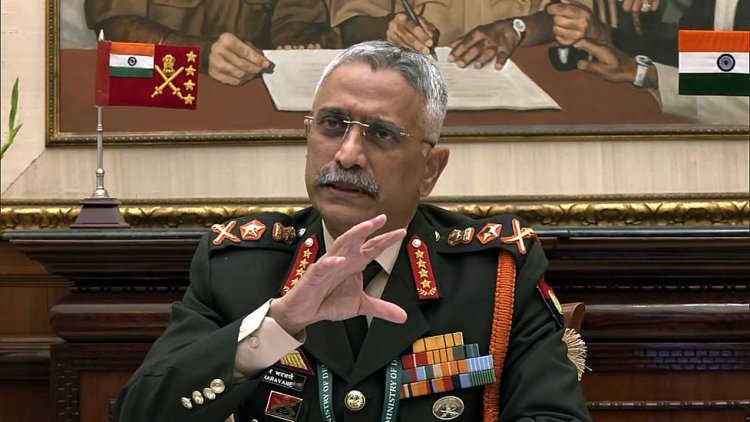Army: Future Warfare to Be Dominated by Cyber, Drones, Ai and Internet of Things: Indian Army Chief
C. Bipindra

Modern warfare will be dominated by futuristic technologies such as cyber, drones and Artificial Intelligence (AI), even as the battlefield undergoes rapid changes, Indian Army chief General Manoj Mukund Naravane has said.
In an interview to this writer, General Naravane said the future battlefields will see greater use of computing power based on quantum technology and AI-based semi-autonomous systems.
"Modern-day battlefield is undergoing a rapid change accelerated by infusion of the latest technology and changing character of warfare," General Naravane said.
"Though it is considerably hard to pick and choose the technologies that will define future warfare, in the short- to medium-term operations in cyber, electromagnetic spectrum, drones and counter drones, systems using artificial intelligence and Internet of Military Things will dominate and are likely to be used as the predominant modes and tools of warfighting," he said.
"Greater computing power based on quantum technology and Artificial Intelligence-based semi-autonomous systems will see greater usage in future battlefields. As the saying goes, data is the new oil and will see greater application across platforms and systems."
General Naravane said the Indian Army needs to be prepared and ready to not only generate, collect, label and collate data from both new age and legacy devices in standardised formats but also use it for enhancing the perceptive and decision-making abilities of the commanders on the ground.
He said suitably conceptualised and developed autonomous systems can enhance all operational and intelligence functions. "Further, force protection in contested spaces is also reduced through effective human-machine teaming. We are already working on change detection, identification of targets from battlefield images, swarming technologies, loitering munitions, exoskeletons, robotic mules, among other things."
The Army chief said pathways were being created to amalgamate these systems into the Indian armed forces, and Centres of Excellence have been established in the fields of AI, 5G and Internet of Things in the military, Quantum Computing, Ballistics, Robotics and Material Technology, to boost work in this regard.
"Successful utilisation of such capability building lies in civil-military fusion, especially in these niche sectors. This essentially means tapping talent from any quarter -- military, civil, private sector or government -- an integrated approach will fulfill future requirements of national security."
General Naravane said capability of indigenous defence production industry is being enhanced and emerging start-ups in these fields are being incentivised by the government.
On the current situation along the borders, the Indian Army chief said the situation along both Line of Actual Control (with People's Republic of China) and Line of Control (with Pakistan) are dynamic in nature and will change from time to time. The Indian Army is well poised and prepared to deal with any emerging contingency not only in eastern Ladakh, but all along the northern borders, he said.
"There is an enhanced collaboration between western and northern adversaries that goes beyond military and economic domains. Pakistan is a major beneficiary of military equipment from China and is rapidly enhancing her military capabilities. Security situation along the western borders remains largely peaceful," the General said on the possibility of a two-front war.
"However, there is an emerging terror-narco nexus sponsored by inimical elements across the border, which is indulging in spreading instability and supporting anti-national elements. Forces along western borders are prepared to counter any military misadventure and retain adequate punitive capabilities."
Acknowledging that military engagement on both the fronts simultaneously would be challenging, General Naravane said the Indian armed forces are well poised and disposed to handle both the fronts simultaneously including internal security challenges.
"While we do so, there would be associated challenges envisaged with respect to operational readiness for a two/two-and-a-half front. We are cognisant of the same and striving ahead to make our deterrence credible along both fronts."
(Courtesy: Defence.Capital)
















